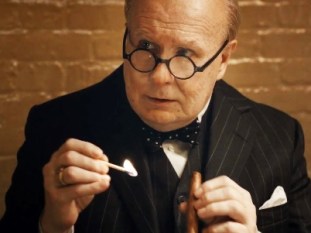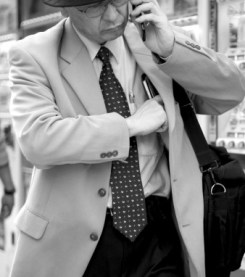
Robberson, Cuccioli, & Cromer; photo: Jerry Dahlia
“A society drowning in violence and seemingly bereft of civil thought or action” is how the Shakespeare Theatre of New Jersey describes the setting for Shakespeare’s bloodiest play, now in a riveting new production, directed by Brian B. Crowe, through August 5. First performed January 24, 1594, it was one of the revenge dramas so popular among Elizabethan audiences and fans of the Death Wish franchise. Here, the desire for revenge trumps every other human feeling, with no possibility of compromise or negotiation.
It’s well worth seeing, not just because the opportunity comes about so rarely and not just because of Shakespeare’s thought-provoking content, but also because of the high quality of this production. The acting and production values are top-notch.
The title character (played by Bruce Cromer) returns to Rome a hero after his conquest of the Goths. His chained prisoners comprise their sultry queen Tamora (Vanessa Morosco), her three sons, and her advisor, a moor (Chris White). When Titus arrives, Roman brothers Saturninus (Benjamin Eakeley) and Bassianus (Oliver Archibald) are vying to replace their late father, the emperor. Given the opportunity to choose between them, Titus chooses Saturninus, who proceeds to claim his brother’s betrothed, Titus’s daughter Lavinia (Fiona Robberson). Skirmishes break out, but Lavinia and Bassianus flee.
Two of Titus’s sons were killed in the war, and the remaining sons demand the sacrifice of the Goth queen Tamora’s eldest son, despite her desperate pleas. Though she speaks honeyed words to Saturninus, her desire for revenge against Titus and all his children is clear.
The moor connives with Tamora’s remaining sons (Torsten Johnson and Quentin McCuiston) to kill Lavinia’s new husband, ravish her, and, so that she can’t reveal their identity, cut off her hands and cut out her tongue. Titus has lost five sons in the play so far, and his last son Lucius (Clark Scott Carmichael) is banished. He is devastated to see the wreck of his daughter. Only the counsel and forbearance of his brother Marcus (Robert Cuccioli) saves him from total madness.
Near the end of the play is a speech by Marcus that for me was the most relevant to politics in our own time: “O! let me teach you how to knit again this scatter’d corn into one united sheaf, these broken limbs again into one body; lest Rome herself be bane unto herself, and she whom mighty kingdoms curtsy to, like a forlorn and desperate castaway, do shameful execution on herself.”
Fine performances of Cromer as Titus, Cuccioni as Marcus, Morosco as Tamora, and her two reptilian sons (Johnson and McCuiston) were excellent. For me, though, the most moving performance came from Robberson, the handless, tongueless, young widow. And White delivers the moor with relish.
It’s fun seeing such a luxuriously large principal cast—16 actors—ably augmented by 11 members of the theater’s 2018 Summer Professional Training Program in multiple roles.
Dick Block created a memorable set, featuring giant swords and an enormous warrior’s helmet, Shakespeare Theatre of New Jersey productions are hosted at Drew University in Madison, N.J. (easily reachable from NYC by train). For tickets, call the box office at 973-408-5600 or visit http://www.shakespearenj.org. Note that STNJ offers special ticket pricing of $30 for theatergoers under age 30!

 Written by Nicolas Verdan, translated from the French by W. Donald Wilson –The European refugee crisis has been front-and-center in the news media for so long it’s become easy to tune it out. In award-winning Swiss author Nicolas Verdan’s literary crime thriller, all the horrifying consequences of what happens when groups of people are ripe for exploitation are on display. And he doesn’t stop there, underscoring how wide its ripples have spread in European society.
Written by Nicolas Verdan, translated from the French by W. Donald Wilson –The European refugee crisis has been front-and-center in the news media for so long it’s become easy to tune it out. In award-winning Swiss author Nicolas Verdan’s literary crime thriller, all the horrifying consequences of what happens when groups of people are ripe for exploitation are on display. And he doesn’t stop there, underscoring how wide its ripples have spread in European society.




 Perhaps you feel about Churchilled out, what with Netflix’s
Perhaps you feel about Churchilled out, what with Netflix’s 





 By Don Winslow, narrated by Dion Graham – For a while yet, perhaps every gritty, noir cop story set in urban America will be compared with the television series The Wire in terms of realism, character development, and sheer storytelling power. (Dion Graham, who narrates the audio version of Don Winslow’s much-anticipated new cop tale played a state’s attorney in that series.)
By Don Winslow, narrated by Dion Graham – For a while yet, perhaps every gritty, noir cop story set in urban America will be compared with the television series The Wire in terms of realism, character development, and sheer storytelling power. (Dion Graham, who narrates the audio version of Don Winslow’s much-anticipated new cop tale played a state’s attorney in that series.)








